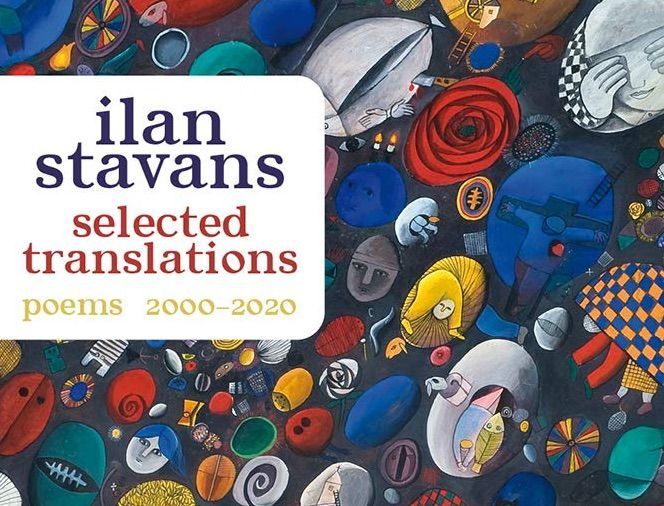Ilan Stavans’s Selected Translations: 2000-2020 appears today from the University of Pittsburgh Press.
¤
Translation is liberation. Words caught in a single language jump out, becoming worlds in another. This is all the more noticeable in poetry, where each sound, each cadence is strategically placed.
I approach translation as hallucination. I let myself go as much as possible, attuned to every type of stimulation, happy to wander as I wonder, eventually coming to the realization that the universe I am in actually depends on me to perpetuate itself. Throughout the process, my mind isn’t fully mine. The fact that I emerge in one piece at the end is nothing short of miraculous.
I’m an immigrant. This is my condition. Immigration is untenable without translation. Translation fosters a kind of immigration. To translate is to survive on a day-to-day basis.
I started my life in Yiddish and Spanish interchangeably, then changed to Hebrew, hoping for redemption, and eventually settled in English, with other companions like Ladino saving me along the way. I am ambivalent about the term “mother tongue” to describe my first language, for where are all subsequent ones left? Are they stepmothers? Mistresses? I also don't like describing them as “firsts” because it gives them an unsustainable location. Whatever tongue one is using at the moment is first. For those reasons, I prefer a leveling of fields: all languages — all my languages, for that matter — are equal; I love them just the same. All are engaged in giving birth to reality.
For me it is harder to think that I was born in Mexico than to say that I was born into Yiddish and Spanish. Languages are more than a lexicon; they contain the DNA of entire civilizations. The words we use aren’t really ours; we borrow them, using them to communicate not only with our contemporaries but with those who preceded us and those who will follow us. It is our responsibility to safeguard them while we also push them onto new heights. And, obviously, while creating new words, for no living language is static.
As for poetry, I disliked it when I was young; I found it remote, pedantic. Age humbles us; it was I, of course, who was being snobbish. Poetry is tradition. In the short time we have on earth, it is up to us to unpack and extend it, to become full-fledged members of that tradition.
In short, I live in translation without an original. Yet originals are sacred to me, starting with the Bible. My duty as translator is to inject them with energy, to make them urgent.
I translate not only from languages I know — if it is at all possible to say that one knows a language — but from those I don’t know. My heroes are John Florio, who made Montaigne feel comfortable in English and, on the way, defined Shakespeare; Richard Burton, whose One Thousand and One Nights is exquisite; Samuel Beckett, who rendered Sor Juana Inés de la Cruz and other colonial Mexican poets in Spanish without knowing a word of it; Joseph Brodsky, who wrote in English while anchored in Russian and vice versa; Jorge Luis Borges, who in 1943, in an essay on William Beckford’s Vathek, argued that “the original is unfaithful to the translation”; and Adrienne Rich, who appreciated, perhaps disingenuously, that if language is power, silence is violence.
This volume features about a hundred translations done over two decades. They were carried out sporadically at the request of a friend or editor. I at times translate bi-directionally: the appendix includes sample translations into Spanish and Spanglish of poems by Elizabeth Bishop, Emily Dickinson, Robert Frost, William Shakespeare, Richard Wilbur, and Walt Whitman.
Robert Frost was dead wrong in saying that poetry is what is lost in translation. It is the other way around: poetry is born out of it.
¤
LARB Contributor
Ilan Stavans is the Lewis-Sebring Professor of Humanities, Latin American and Latino Culture at Amherst College, the publisher of Restless Books, and the host of the NEPR podcast In Contrast. He has written Quixote: The Novel and the World (2015), Oy, Caramba!: An Anthology of Jewish Stories from Latin America (2016), Borges, the Jew (2017), and The Wall (2018). He has recently written The Seventh Heaven: Travels through Jewish Latin America (Pittsburgh), and his book-long poem “The Wall” (also Pittsburgh) won the 2019 Massachusetts Book Award in Poetry.
Did you know LARB is a reader-supported nonprofit?
LARB publishes daily without a paywall as part of our mission to make rigorous, incisive, and engaging writing on every aspect of literature, culture, and the arts freely accessible to the public. Help us continue this work with your tax-deductible donation today!
